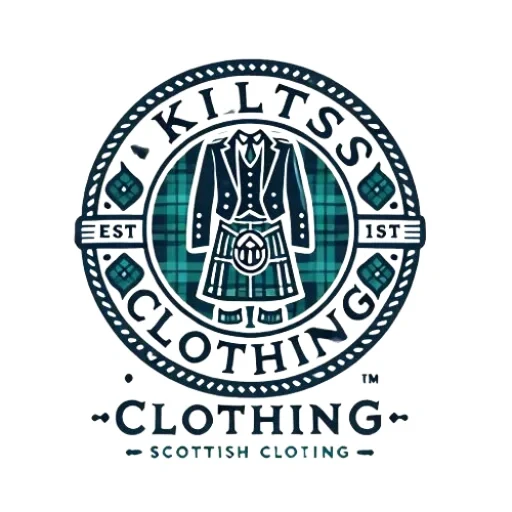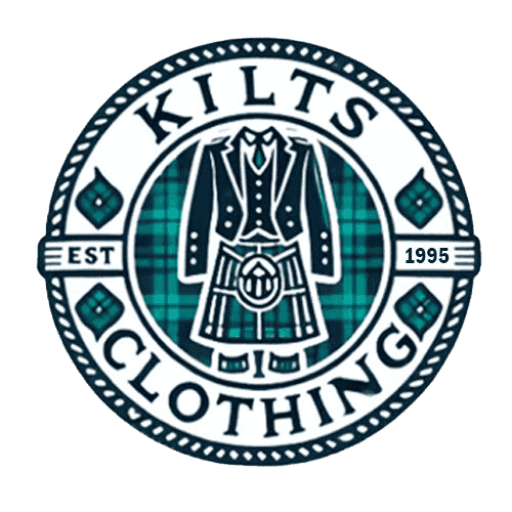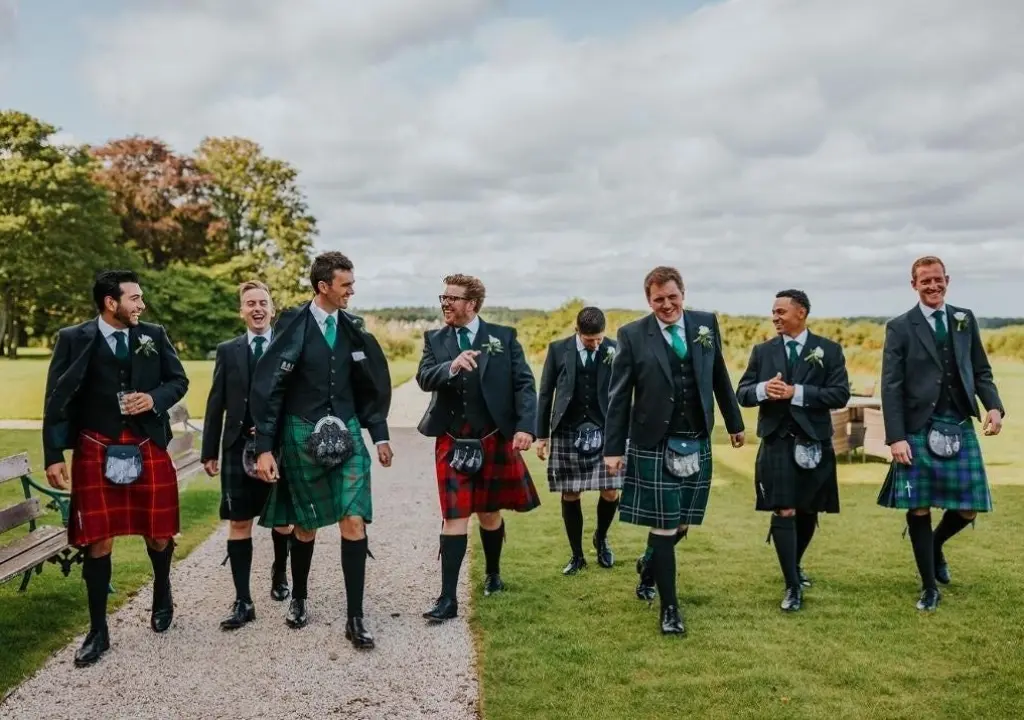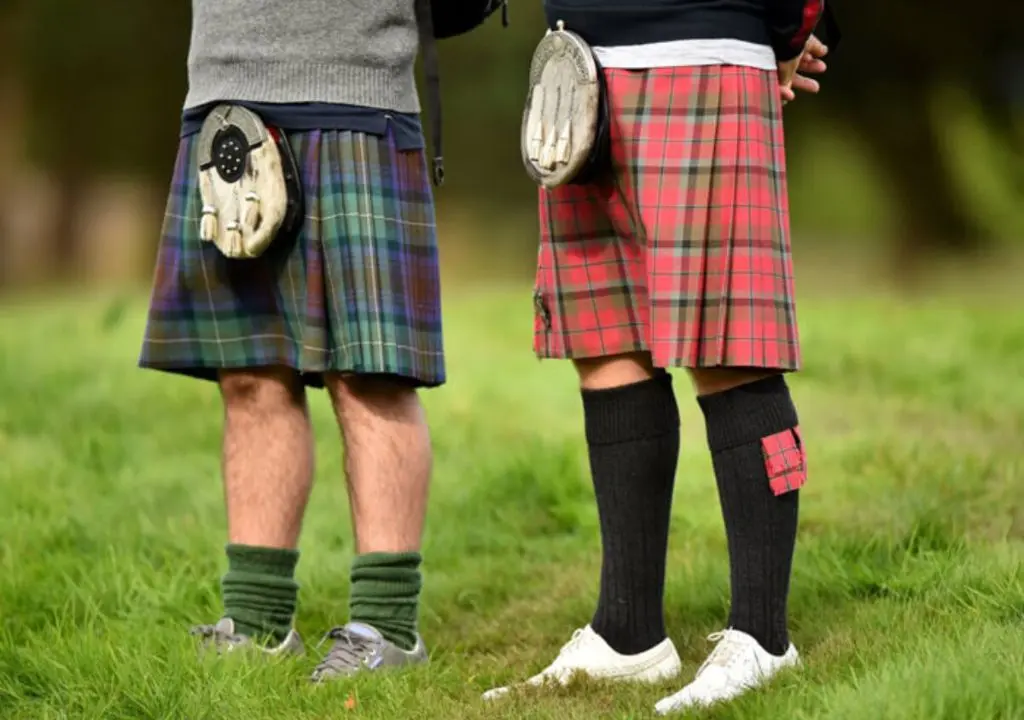The Difference Between 5-Yard Vs. 8-Yard Kilts
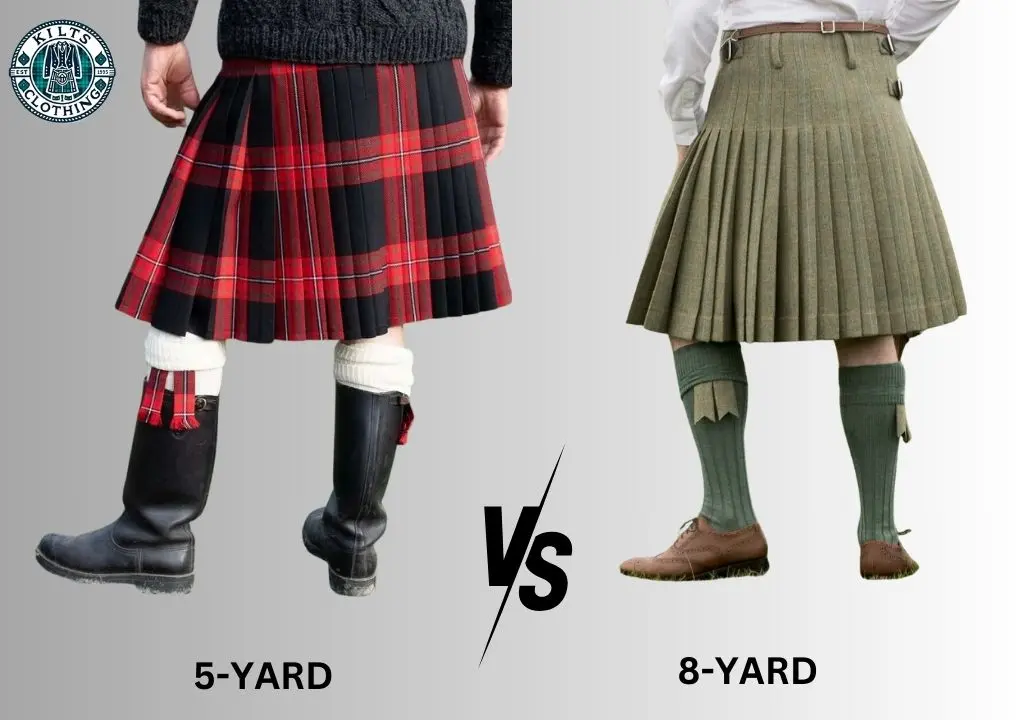
When you think of traditional Scottish attire, what comes to mind? Most likely, the kilt—a garment steeped in history and symbolism. But did you know there's more to kilts than just their striking tartan patterns? Specifically, the debate between the 5-yard kilt and the 8-yard kilt is crucial for anyone interested in Traditional Kilt. Understanding the differences can help you make an informed choice, whether attending a formal event, exploring your Scottish Heritage, or simply looking for a Casual Kilt.
Understanding the Basics: 5-Yard Kilt vs. 8-Yard Kilt
What is a 5-yard Kilt?
A 5-yard traditional kilt is a modern interpretation of the traditional kilt, designed for those who prioritize comfort and practicality. With less fabric, this kilt is notably lighter, which makes it a popular choice for Kilt for Summer Wear or casual settings. The reduced 5-yard Kilt Weight offers greater mobility, making it perfect for day-to-day wear or for those who prefer a less bulky option. Despite its lighter nature, the 5-yard kilt still maintains the elegance of traditional kilts but with a focus on ease and comfort.
What is an 8-yard Kilt?
On the other hand, the 8-yard kilt is often regarded as the gold standard in Highland Wear. With more fabric, it features numerous 8-yard Kilt Pleats, contributing to its fuller and more traditional appearance. This kilt is typically chosen for formal occasions due to its association with Scottish heritage kilts. The extra fabric adds to the garment's Kilt Durability and enhances its Kilt Swing, providing a dramatic flair that is both timeless and sophisticated.
Fabric Weight and Pleating Differences
Kilt Pleating and Fabric Options
Regarding Kilt Pleating, the number of wrinkles and the depth of these wrinkles play a significant role in the kilt's overall appearance. The 8-yard kilt is known for its intricate Kilt Pleating Depth, which allows for a more detailed and traditional look. Meanwhile, the 5-yard kilt offers a simpler pleating structure, ideal for those who prefer a more understated style. The fabric choice also varies; Wool Kilts are traditionally heavier and provide excellent Kilt Breathability. Polyviscose Kilts offer a lightweight alternative that's easier to maintain and perfect for warm climates.
Kilt Fabric Weight
The Kilt Fabric Weight is another crucial factor to consider. Wool Kilts are heavier, providing warmth and a structured appearance ideal for formal settings. However, if you're looking for something more versatile, Polyviscose Kilts are lightweight, making them more comfortable for everyday wear or in hotter weather. The fabric weight directly impacts the kilt's Kilt Swing and overall Kilt Comfort, with heavier fabrics providing a more pronounced swing and lighter fabrics offering greater ease of movement.
Durability and Comfort Comparison
Kilt Durability
Kilt Durability is often a primary concern when investing in a kilt. The 8-yard kilt, with its substantial fabric and deeper wrinkles, is generally more durable and resistant to wear and tear. This makes it an excellent option for those who plan to wear their kilt frequently or for those who need a kilt that will stand the test of time. In contrast, the 5-yard kilt is durable in its own right but is best suited for casual or less frequent wear.
Kilt Comfort and Mobility
Kilt Comfort is essential, especially if you plan to wear your kilt for extended periods. The 5-yard kilt excels in this area, offering lighter fabric that reduces the bulk and weight of the garment, making it easier to move in. This Kilt Mobility is ideal for casual or outdoor events where comfort is key. Meanwhile, the 8-yard kilt may be heavier, but its structured fit and traditional look provide a unique comfort from wearing a garment rich in Heritage and tradition.
Kilt Pricing and Craftsmanship
Kilt Pricing Comparison
In terms of cost, there is a clear difference between the 5-yard kilt and the 8-yard kilt. The Kilt Pricing Comparison often reveals that 8-yard kilts are more expensive due to the additional fabric and the time required for Kilt Craftsmanship. The intricate pleating and high-quality materials contribute to a higher price point. On the other hand, 5-yard kilts are generally more affordable, making them accessible for those who want a traditional kilt without breaking the bank.
Custom-Made Kilts
For those looking to invest in a kilt that fits perfectly, Custom-Made Kilts are an excellent option. These kilts can be tailored to your measurements, ensuring the perfect fit. Custom kilts can also be made with your choice of Tartan Patterns and fabric, allowing you to personalize your kilt to reflect your Heritage or personal style.
Choosing the Right Kilt for Different Occasions
Kilt for Formal Wear
If you're attending a wedding, a formal gathering, or any event that calls for traditional attire, the 8-yard kilt is the ideal choice. Its fuller fabric, deeper wrinkles, and more elaborate design make it perfect for Formal Kilts that must make an impression. The kilt's Kilt Craftsmanship and the selection of high-quality Wool Kilts or Clan Tartan fabrics further enhance its suitability for such occasions.
Casual Kilts for Everyday Use
For those seeking a kilt that offers both style and practicality, the 5-yard kilt is perfect for casual, everyday use. It is easier to wear, lighter, and more comfortable, making it ideal for a Kilt for Summer Wear or less formal events. The Kilt Fabric Options in Polyviscose Kilts add to its versatility, offering a practical solution that doesn't compromise style.
Kilt Accessories and Maintenance
Kilt Accessories
Remember the importance of Kilt Accessories to complete your kilt outfit. Items such as Kilt Buckles, sporrans, and traditional socks are essential to achieving the authentic Scottish look. These accessories enhance the aesthetic appeal of your kilt and add functionality, such as providing storage or adjusting the fit of the kilt.
Kilt Maintenance
Maintaining your kilt is crucial for ensuring its longevity. Wool Kilts typically require dry cleaning and careful storage to preserve their fabric and pleats. Polyviscose Kilts are easier to maintain, often being machine washable. Regular maintenance, such as checking for loose pleats and properly airing out the kilt after wear, can significantly extend the life of your kilt, ensuring it remains a treasured part of your wardrobe for years to come.
Conclusion
In conclusion, choosing between a 5-yard and an 8-yard kilt largely depends on your preferences, the occasion, and how often you plan to wear the kilt. The 5-yard kilt is ideal for those seeking comfort, mobility, and a more casual style, making it perfect for everyday wear or less formal occasions. On the other hand, the 8-yard kilt offers a more traditional, formal appearance, with greater durability and a fuller look, making it the go-to choice for special events and for those who want to honour their Scottish Heritage.
Both kilts have unique advantages, and by understanding the differences in Kilt Pleating, Fabric Weight, and Kilt Craftsmanship, you can make an informed decision that best suits your needs. Whether you opt for the ease and practicality of a 5-yard kilt or the traditional and formal appeal of an 8-yard kilt, both options allow you to embrace the rich history and style of Traditional Kilt.
FAQs
The main differences lie in the fabric weight, pleating depth, and overall fullness. The 8-yard kilt has more fabric, deeper wrinkles, and a fuller appearance, while the 5-yard kilt is lighter and more suitable for casual wear.
The 8-yard kilt is generally better for formal events due to its traditional look, deeper wrinkles, and use of heavier fabrics like wool.
Yes, a 5-yard kilt is typically more comfortable and offers better mobility, making it a good choice for casual wear or warmer climates.
Yes, 5-yard and 8-yard kilts can be custom-made to fit your measurements and preferences, including fabric choice and tartan pattern.
An 8-yard kilt is a traditional Scottish kilt made using eight yards of fabric. This type of kilt is known for its extensive pleating, which creates a fuller and more elaborate look. It is commonly worn for formal occasions and symbolises Scottish heritage.
A good kilt typically requires 5 to 8 yards of fabric, depending on its intended use. A 5-yard kilt is suitable for casual wear, offering comfort and mobility. In contrast, an 8-yard kilt is the standard for formal and traditional occasions due to its fuller appearance and deeper wrinkles.

